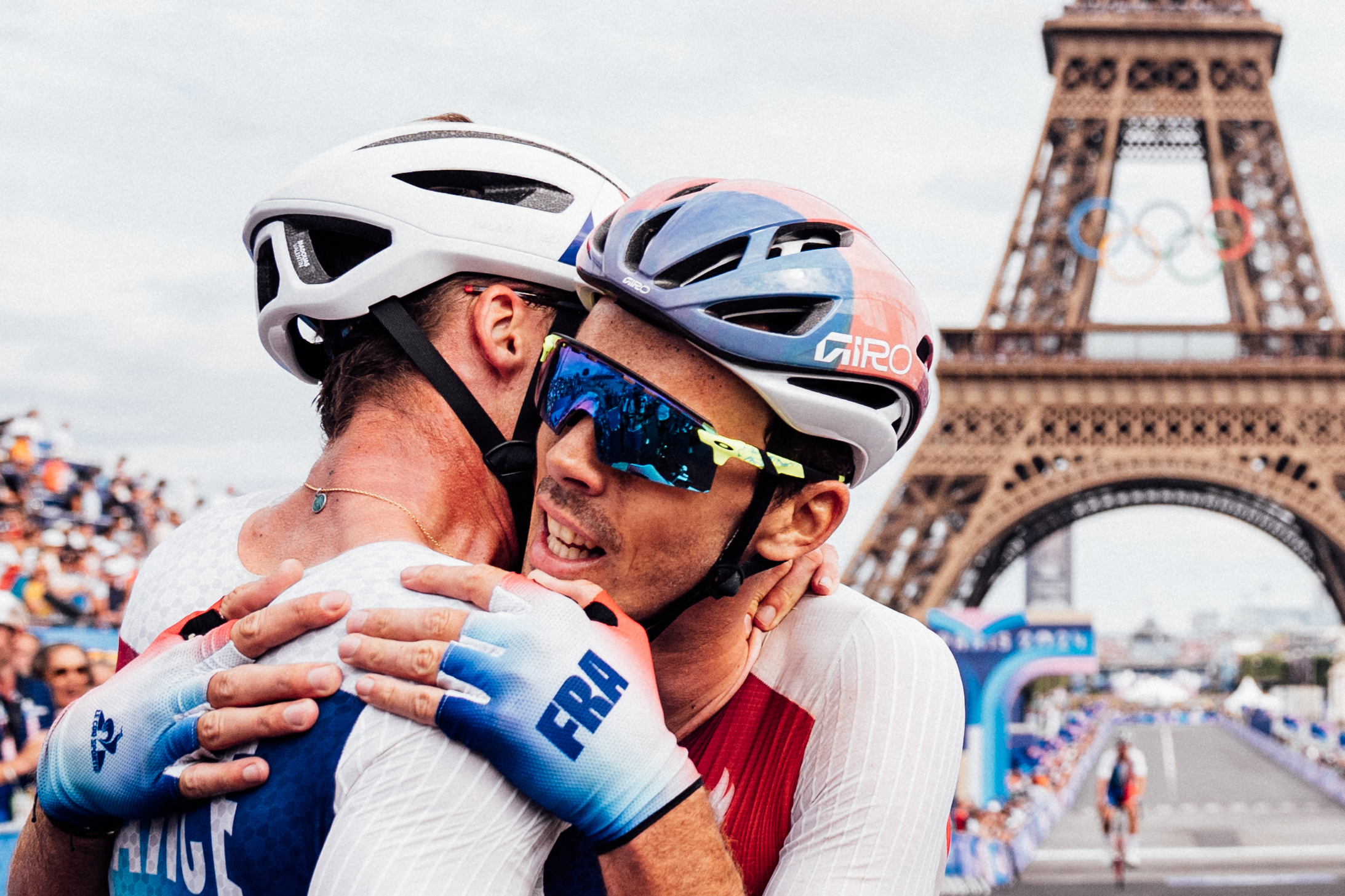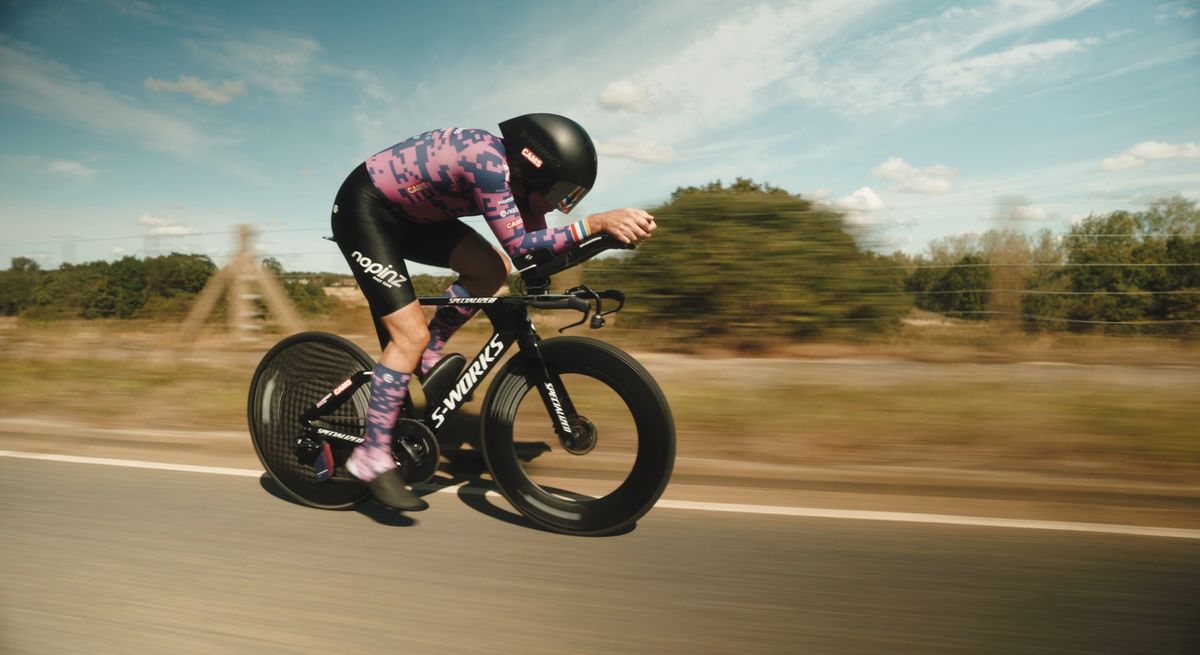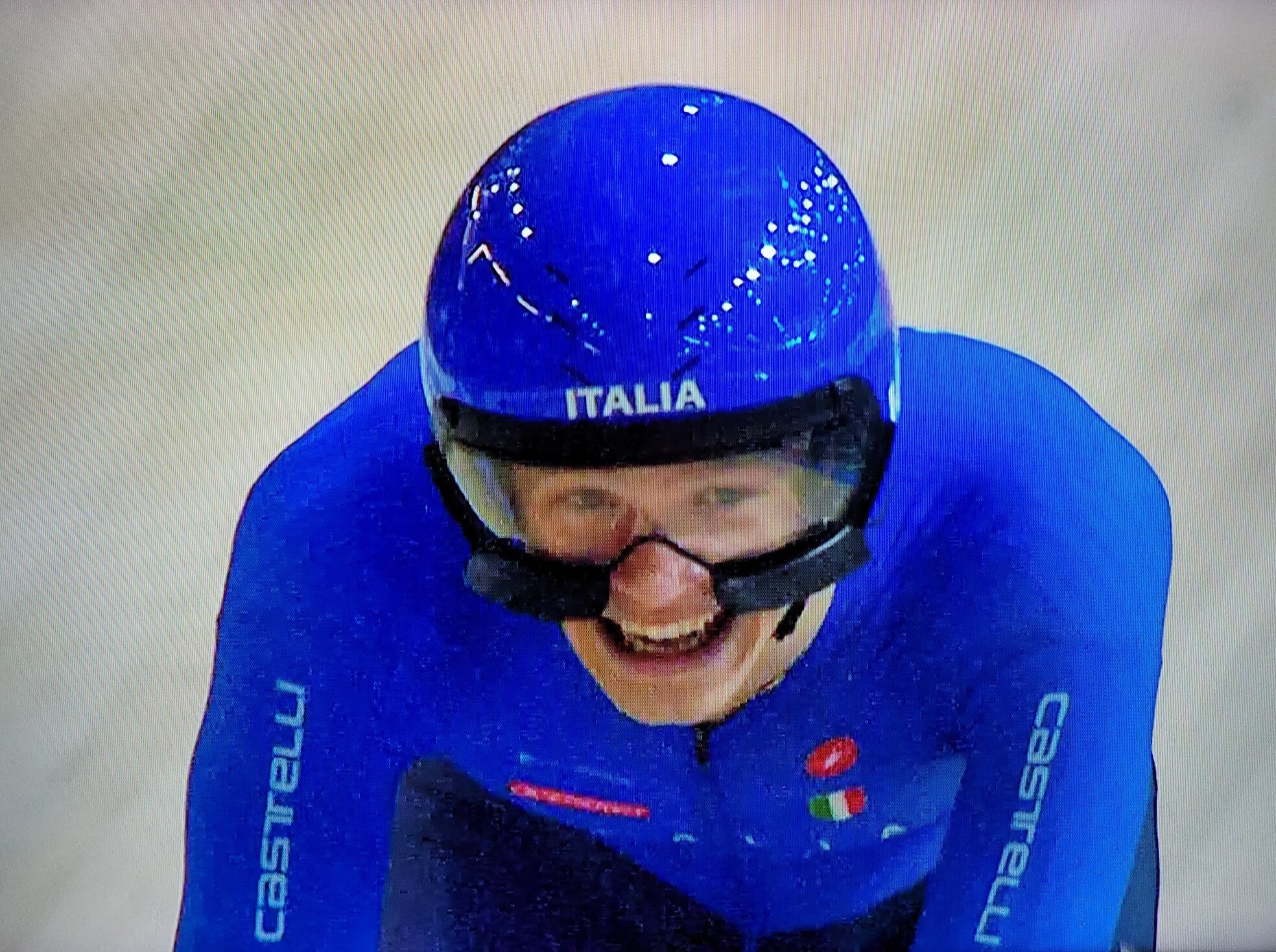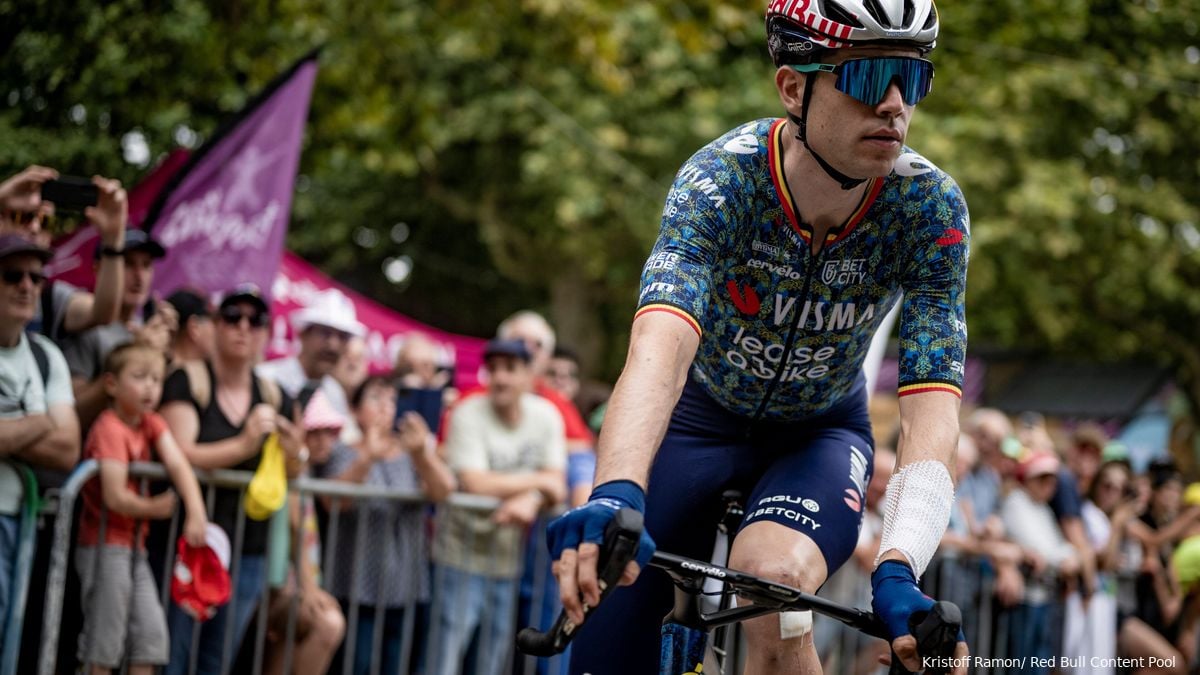On Saturday August 3rd, one minute and eleven seconds after Remco Evenepoel lifted his bike in front of the Eiffel Tower, producing an image so powerful that we’ll probably still be talking about it in fifty years, Valentin Madouas crossed the finish line second place. His hand covered his mouth in shock as he realized what he was going to do: win an Olympic silver medal, have his name written into the history books, ride for his country, in his homeland. The opportunity of a lifetime realized.
It was a rare sight – not the celebration of a silver medal, which can represent many things at the Olympics, from defeat to the fulfillment of a lifelong dream – but the celebration of a cyclist’s second place finish. In a sport where only a rider can raise their arms as they cross the finish line and where victory is everything. At least it seems that way at first glance.
The Olympic Games, and perhaps to a lesser extent the World Championships, are a rare example of racing cyclists being genuinely happy about second or even third place. Standing on the podium at events like these and taking home a medal – even if it’s not a gold medal – are some of the highest achievements a cyclist can aspire to. It is generally accepted that the Olympics do not mean as much in cycling as they do in other sports, where they represent the absolute pinnacle of success, but that does not make an Olympic medal any less significant. If a rider has a decades-long career ahead of them, they might be lucky enough to have three chances to win one of nine medals. Those are pretty slim chances, even by cyclist standards.
However, putting the Olympics aside, one could argue that Madouas’ reaction, while exaggerated given the circumstances, represents a broader problem in the world of men’s cycling right now. Because competing against so-called “superhuman” riders like Remco Evenepoel and Tadej Pogačar means accepting that in many, if not all cases, second place is the best you can hope for.
You can explore similar questions with Ask Cyclist, our new AI search engine.


If you want to ask your own question, all you have to do is click or log in.
Group Two Syndrome


When you leave behind the pomp and ceremony of the big races, the plight of the above-average but not superhuman driver becomes clear: you enter a race with Tadej Pogačar (or depending on the race: Remco Evenepoel or Mathieu van der Poel – or Primoz Roglič if it’s the Vuelta) and you’re practically signing up to lose. The statistics are clear.
Of course, it’s never over until it’s over, and the myriad external factors that can and do arise from race to race can turn the hand of fate against even the most experienced riders. However, odds dictate that once one of these titans goes on a solo outing for victory, you’ll likely be fighting for second place.
So what options do the others have once the day’s massive individual attack is launched? From here, a decision must be made: work together to hunt down the leader in the vain hope that victory might still be an option, or attack each other and seek the best possible outcome?
This has led to frustration on several occasions in recent seasons, as fans urge the chasing groups to work together to catch the only leader, because no matter how good Pogačar or Evenepoel are, surely the laws of physics apply? Surely the power of the many can overwhelm that of the one? But call it what you will – mind games, risky action, a small-scale societal collapse – the cohesion needed to orchestrate such a comeback is lost.
Maybe it will be lost after they actually work well together for a while. Maybe it gets lost the moment one rider in the group stops contributing and they start looking at each other. In reality, the psychological war has already begun before a single rider pedals in anger. And it was won. Usually by the tufted Slovenian as soon as he signs his name and clatters his cleats across the presentation platform that morning.
It’s not that breakaways aren’t capable of making it to the end – even if Pogačar is in a race. Normally, however, it is a Grand Tour stage, and only after the United Arab Emirates has reluctantly loosened its iron grip on the race – but Grand Tours are a different matter entirely. In a one-day race, it’s all about going all out to the finish line, and the odds are never in your favor. And with each race, that certainty becomes more deeply embedded in the collective psyche of the peloton, causing hope to be lost more and more quickly and refocused as they prepare to take on the people around them rather than themselves to embark on a fruitless chase for a victory that is already lost.
Second is the new first


If we are honest with ourselves, this dominance will continue for a while, and after Pogačar has proven that he can attack from 100 km away and still not run out of energy, this pattern of giving up the chase and focusing on the fight follows to concentrate because second place will become even more commonplace. It’s hard to swallow when “the superhumans” aren’t your favorite riders, even if you’re impressed by their exploits, but on the biggest stages – in Monuments, Worlds and on the top step of GC in Grand Tours – these guys have probably had a monopoly for a few years.
So it’s time to get comfortable with our discomfort. To enjoy the fun and games of “Group Two Syndrome” as top riders battle it out to achieve the best possible result. Yes, cycling is traditionally all about winning, but popular riders like Raymond Poulidor and more recently Wout van Aert have become synonymous with that second place finish, and rather than deriding them as the best, why not celebrate consistent, top ten performances -Placements, podiums and generally just the skill and determination to be among the best riders in the world in an era that will truly go down in the history books?
After all, these positions mean nothing. For the people who build palmares This is something they can be proud of after their racing career and say: “I was up there when Pogačar won his fourth Il Lombardia.” In a more practical and immediate sense, high placings are real for the teams these riders belong to in terms of UCI points significant.
With a three-year relegation cycle from the WorldTour, there is much more to gain for many of the teams that bring their best and brightest to the road despite the infinitesimal chance of winning. The whopping 715 points that Ben O’Connor earned for his excellent – and much celebrated – second place to Pogačar in the World Championships road race will keep Decathlon AG2R coffers topped up despite his impending departure. The 400 points for Pello Bilbao, second at the GP Montreal? Bahrain Victorious have gratefully accepted it, although it is not urgently needed – they currently sit tenth in the UCI rankings – but any place could mean a more attractive prospect for potential sponsors. However, the 225 points for Ion Izagirre in fifth place in the same race Was This is much needed and likely to be greatly celebrated by a Cofidis team sitting at the bottom of the table.
From the perspective of a fan and the drivers who keep giving everything for victory, victory is perhaps the most important thing, but it is not everything. Romain Bardet finishing second at Liège-Bastogne-Liège at the end of his career meant a lot to so many – not least his team, who were delighted with the fruits of his labor: 640 delicious UCI points to add to his total given their second-to-last They had a great need for place in the rankings. But much more than that: in a race in which the Frenchman had climbed off the bike to help Julian Alaphilippe after a serious crash two years earlier, this “best of the rest” place was a reward for a good man in form by him His career peaked in his last full season on the track. It really meant something.
Looking back at the year’s results and seeing 2s, 3s, even 8s or 9s can mean the world to a rider – be it the biggest achievement of their entire career or simply because in practice it represents a healthy portion of prize money or one Salary increase. And while we as fans will never give up hope for our favorites to win – and those sweet moments of victory will remain the highlight of the fan experience, rare as they may be – let’s cut ourselves and the drivers some slack.
Let’s celebrate second place like it’s a victory. Enjoy a podium finish and recognize the hard work that went into this step. And don’t just start and end our conversations about the weekend’s races with number one.
Personal bests


The big racing season ironically ended with Remco Evenepoel finishing second behind Pogačar, and while both performances deserved high praise, third place at Il Lombardia took on more significance than usual, and Lidl-Trek’s Giulio Ciccone proved how it meant a lot , as he attacked with a kilometer to go to ensure an Italian was on the podium. That third place meant something – and these lower rankings will continue to enjoy heightened significance in the years to come – as they always should.
Perhaps there is no finer example of celebrating second and third place than outgoing Decathlon-AG2R La Mondiale GC leader Ben O’Connor, who not only openly expressed that his goal for the season was to… to be on the podium in a Grand Tour (he also achieved this in the Vuelta after finishing fourth in the Giro), but also celebrated this success as a victory because it was the fulfillment of an ambition and a proof of his self-confidence.
As O’Connor and company set their own personal goals without the burden of being a history-making athlete, it reminds us all that sports, cruel as they may be, also provide an arena for athletes offers where they can train to develop into the best possible versions of themselves. Witnessing these developments alongside the incredible achievements of the sport’s past and future kings is a true, if not more subtle, privilege that can also be celebrated if, like them, we are able to look beyond the victory.



